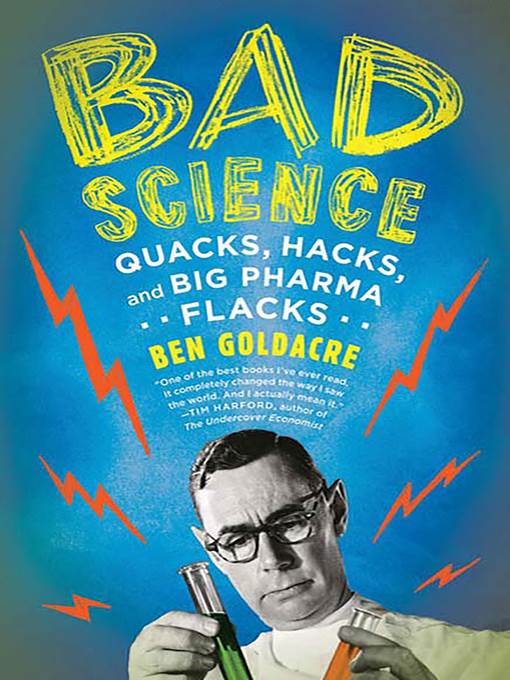
Bad Science
Quacks, Hacks, and Big Pharma Flacks
کتاب های مرتبط
- اطلاعات
- نقد و بررسی
- دیدگاه کاربران
نقد و بررسی

August 23, 2010
Goldacre is the acerbic quackbuster who's a thorn in the side of celebrity nutritionists and alternative medicine practitioners in Britain through his "Bad Science" column in the Guardian. And now this M.D. and formidable investigative journalist brings his eye-popping insistence on rigorous science to this side of the Atlantic. There's plenty to debunk, like the detox footbaths that turn brown whether your feet are in them or not. Or the homeopathic remedies that are no more effective than placebos (i.e., sugar pills). Goldacre's on to Big Pharma as well, skewering the industry's manipulation of statistics and suppression of negative results in clinical trials. The media take their hits as well for fueling the scare over the measles-mumps-rubella vaccine's link to autism—a link that researchers have definitively debunked. And there's hell to pay for the growing legion of nutritionists and the lucrative nutritional supplement business, which come under Goldacre's special derision as "The Nonsense Du Jour" and "intellectual crimes." Not that Goldacre's always so solemn or scolding. His ongoing battle with Brit nutritionist Gillian McKeith is both unsettling and an amusing illustration of how simple it is to pull back the curtain on the wizard of Oz.

August 1, 2010
British National Health Service physician Goldacre shoots down what he considers to be quackery.
This updated version of the UK edition, published in 2008, begins with the statement, "Homeopaths are morons." However, the author's real targets are not proponents of alternative medicine—although he considers their remedies to be no more effective than "sugar pills"—but the ignorance of the vast public who are led astray by media hype and advertisers. The author writes the weekly "Bad Science" column for The Guardian, which, like the book, is intended to help people "who are angry about the evils of the pharmaceutical industry and nervous about the role of profit in health care." While his dismissal of concerns about the use of MMR vaccine—an immunization shot against measles, mumps and rubella which many suspect may trigger autism in some children—are a bit cavalier, his purpose in writing is not to defend "big pharma" but to give the reader the tools to understand "how a health myth can be created, fostered, and maintained by the alternative medicine industry, using all the tricks on you, the public that big pharma uses on doctors." This edition includes an account of a libel suit filed against Goldacre and The Guardian, which was settled (in his favor) in 2008. The author had investigated the nefarious activities of a group of big-money entrepreneurs who had spread a conspiracy theory in South Africa. In order to market vitamins as a replacement for antiretroviral therapy in the treatment of AIDS, they circulated the big lie that the pharmaceuticals not only did not retard the disease but were responsible for its spread. For Goldacre, it is these "journalists and miracle cure merchants" who undermine people's understanding of the scientific basis for good medicine.
The author's attacks on alternative medicine are often misguided, but he provides a valuable service in exposing the countless examples of bad science being perpetrated throughout the medical community and in the press.
(COPYRIGHT (2010) KIRKUS REVIEWS/NIELSEN BUSINESS MEDIA, INC. ALL RIGHTS RESERVED.)

September 15, 2010
British doctor Goldacre is in a tizzy and wants you to know about it. He's sick of unproven medical advice, homeopathic treatments, and poor pseudoscientific educational and nutritional programs. He writes the Guardian's "Bad Science" column and feels strongly about the healthy doses of misinformation floating around, buoyed by poorly conducted research studies. Explaining the meaning of randomized, double-blind, placebo studies, he directs his wrath at supplement hucksters past and present. Originally published in the UK, his book has been updated for American audiences--it features both UK and U.S. examples--and includes a chapter he was unable to publish previously because of a lawsuit. Funny and profane, Goldacre discusses the horror of U.S. pharmaceutical marketing campaigns, the value of evidence-based medicine, and how to lie with statistics. From vaccine scares to murder cases, there's something for everyone. VERDICT Great fun for science and statistics geeks, this is challenging in the best sense of the word. Recommended for public, academic, and medical libraries.--Elizabeth Williams, Washoe Cty. Lib. Syst., Reno, NV
Copyright 2010 Library Journal, LLC Used with permission.

October 15, 2010
British doctor Goldacre is funny and blunt as he bashes journalists, nutritionists, homeopaths, politicians, and pharmaceutical companieshis favorite targets. Many supposed experts, he writes, are actually people like Gillian McKeith, who recommends enemas for forehead pimples and whose PhD comes from a nonaccredited correspondence course. Goldacre also criticizes South Africas health minister, who turned down antiretroviral drugs for AIDS sufferers, instead advocating for raw garlic, lemons, beetroot, and potatoes. Weaving in medical history, he covers famous mistakes, such as Dr. Spock advising moms to put their babies to sleep on their bellies (now known to increase the risk of sudden infant death syndrome) and Dr. Andrew Wakefield erroneously linking vaccines and autism (which led many parents to stop immunizing their kids). No coward, he takes former prime minister Tony Blair to task for refusing to say whether he had vaccinated his son. Some readers may wish for more American examples and institutions because this was supposedly retooled for the U.S. market. But all in all, Bad Science is a fun, informative read.(Reprinted with permission of Booklist, copyright 2010, American Library Association.)

























دیدگاه کاربران